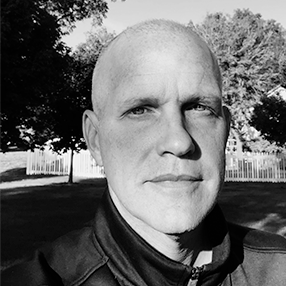Poem that Wanted to Be a Brueghel
Snowy road with red
soil ruts where a wagon struggled.
Bare trees in middle distance
man with stick and pack
trudging uphill, off balance.
Is he running? And then I’m
back at the podium, all the suits
in the room looking at me like
where did you go?
Something was cold and afraid.
Someone went looking.
It must’ve been amazing
for the great painters when it drifted
into their eyes—the moment
they could freeze the action
before the terrible realization
that would echo through generations.
Field work in a dry summer.
Blue sky and blaze yellow.
Sweat on the brow of my father
just a boy now, seventeen, lean
and earnest, tight with exertion
pounding fence posts
with a man I never met, his father.
Dad swings the sledge down
just as the blank man, glancing back
toward the distant barn, places his hand
gently on top of the post
to say that’s enough. That’s good, son.
And the hammer is a breezy blur
stopped magically in air
to never disfigure, sever
flesh or family tree but still I
dab paint over my father’s eyes
so he won’t have to see.
Copyright © 2021 by William Stobb. Originally published in Poem-a-Day on November 26, 2021, by the Academy of American Poets.
“This poem follows Auden’s ‘Musée des Beaux Arts’ in its wonder at Breughel’s works, which seem to stop time. What is it like for the painter, seeing the image of a moment emerge? What if you could stop time before a terrible event occurs, one that has a terrible impact on generations of a family? A painter could create a small world free of that pain; of course it’s not the painter’s world. Yes, there’s an achievement—you can see and maybe feel that world—but there’s sadness, too, returning to where the sledgehammer crushes the father’s hand.”
—William Stobb

